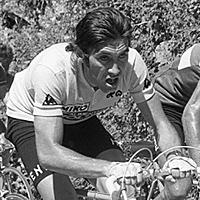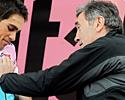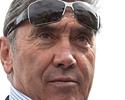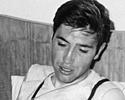
Recently on Cyclingnews.com |
Tales from the peloton, May 28 2009
The Belgian Italians couldn't resist - Eddy Merckx
Italians endear their 'champion of champions' with the term Campionissimo. A recent book capturing Belgian legend Eddy Merckx's career in photographs has been titled 'Merckxissimo'; very apt indeed given his achievements in Italy. Cyclingnews' Les Clarke discovers how Merckx became the only non-Italian ever to dominate the event.
 |
Five overall victories in the Giro d'Italia - 1968, '70, '72, '73 and '74 - would have been the definitive results on the palmares of most riders in history. In Merckx's case however, they were just part of the list that included five Tour de France wins, a Vuelta crown, plus at least two wins in each of cycling's five monuments - Milan-Sanremo, Ronde Van Vlaanderen, Paris-Roubaix, Liège-Bastogne-Liège and Giro di Lombardia.
While most fans associate his name with the Tour and the Classics, Merckx enjoyed a record 78 days in the maglia rosa, more than any other rider in the event's history. We'll look at his first and last Giro titles - 1968 and 1974 - because each typifies the type of rider he was and why he was embraced by the Italian cycling public.
1968 - 'The Cannibal' lives up to his nickname
The reasons why the moniker 'The Cannibal' was bestowed upon Eddy Merckx are well known. In 1968 he clearly illustrated why this was the case, with a Giro d'Italia performance so dominant it netted him top ranking in all three classification - overall, mountains and points.
Like many of Merckx's results, the distance between victor and runner up was substantial. His first Giro win, taken as a plucky 22-year-old, was by a five-minute margin. With it he joined the likes of Coppi and Bartali as riders who took their first Giro title at a young age. All three men were exceptional professionals, although Merckx was something else altogether and the Italian public knew it.
 |
He had already won Milano-Sanremo at the tender age of 20, beating an Italian, Adriano Durante and countryman Herman Van Springel, while the likes of Raymond Poulidor, Lucien Aimar and Felice Gimondi were also left in his wake. The 1968 Giro was his first Grand Tour win and began a run of 11 Grand Tour victories between that year and 1974.
During that period there wasn't a year he didn't win at least one of the season's three Grand Tours, and his first Giro victory was a display of the disregard he held for the 'world order' which he encountered early in his career. He spent the next 10 years reshaping the status quo. To put it quite simply, he was the king.
Italy's cycling fans watched in amazement in 1968 as he controlled the race at will to finish with the maglia rosa in Milan. Having taken stages one and eight, he secured the leader's jersey for keeps with an amazing performance on the climb to Tre Cime di Lavaredo; it wouldn't be the last time the tough mountain pass defined the Belgian as a rider.
It was an epic Giro, the result befitting the dawning of a new age in cycling - the Merckx generation. He'd have to wait two years before his next Giro d'Italia crown, but Italians had already fallen for the handsome man from the flatlands who could fly in their mountains.
1974 - Merckx's dominance on the wane?
 |
Having taken another three Giro d'Italia titles since his first triumph in 1968, Merckx faced his sternest test during the 1974 Giro. He was constantly under threat from the Italian riders - names such as Gianbattista Baronchelli, Felice Gimondi, Giovanni Battaglin and Francesco Moser were all making their bid to dethrone the king who had reigned for three of the four previous years.
They were aided by the punchy Spaniard, Jose Manuel Fuente, who had shown his hand at that year's Milano-Sanremo but had fallen short. It was a recipe for exciting racing and the peloton didn't disappoint, maintaining its fight against The Cannibal to the end, particularly on the third-to-last day.
Stage 20 took riders on a journey from Pordenone to Tre Cime di Lavaredo over 163km which included three monster climbs - Monte Rest (1,042m), Passo Mauria (1,283m) and the Tre Cime di Lavaredo (2,377m) - the 'Cima Coppi' of that year's race. Like he had done in 1968, Merckx would display his ability as a champion on the day's final climb, although in very different circumstances.
Fuente had been threatening to tear into Merckx's lead during the final week; the Spaniard's accumulated frustration became too much ahead of the climb up the Tre Cime di Lavaredo, the day's final test. Pushing an unfathomably big gear for such a slightly-built man, Fuente was the joker in the pack as the vultures - Gimondi and Baronchelli - circled the man in pink, Merckx.
There was a scalp to be had, and it was that of the raven-headed Belgian who had conquered all before him in Italy's Grand Tour over a five-year period. With Merckx driving the chase, Gimondi and Baronchelli were intent on picking up any scraps should the reigning champion stutter or fail completely. They themselves were only hanging on, but the possible prize for doing so was the Giro itself.
 |
Looking the antithesis of modern coaching manuals, Fuente continued up the climb, mashing his big gear, shoulders bobbing, head coming closer to the handlebars. The effort was extreme - this was a hardened attack on Merckx's superiority. He had tried it a number of times in 1973 but Merckx still reigned supreme, taking his fourth title by seven minutes 42 seconds. The margin of victory in 1974 would be nowhere near that.
And Fuente was trying his best to ensure Merckx held no advantage at all by race's end; he had the Belgian on the ropes with only three kilometres remaining in the stage. It was comparable to the heavyweight boxing world championship fight held in Zaire that same year - 'The Rumble in the Jungle' looked destined to be the dawn of a new era, the time when a supposedly fading champion was overcome by his challengers.
Just as Mohammed Ali used the ropes to his advantage and prevailed against those who wanted his crown in what could be considered an 'unattractive' manner, so too Merckx held on against the pack that pushed hard for his downfall in the Giro. By the summit finish he had managed to limit his losses to one minute and 47 seconds and held off both Baronchelli and Gimondi.
By race's end two days later, on June 8, Merckx finished the 1974 Giro with a slender lead of 12 seconds over Baronchelli, while Gimondi trailed the Belgian by only 33 seconds. The Cannibal may not have been the dominant force he had been during his first Giro victory but he had proven he could overcome the most spirited challenge. Less than two months after fighting off the challengers in Italy he won his fifth Tour de France title, proving yet again why he was 'Merckxissimo'.
Photography
For a thumbnail gallery of these images, click here
Images by AFP Photo
- Eddy Merckx is so beloved by the Italians that they ask him to give away the pink jersey. Here he presents it to Alberto Contador.
- In 1969, Merckx had his blackest year being disqualified for doping at the Giro despite a lack of counter-analysis.
- Eddy Merckx went on to win the 1974 Tour de France after taking a slim victory in the Giro.
- Eddy Merckx still looks the part of "the Cannibal" today.
